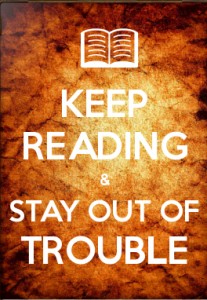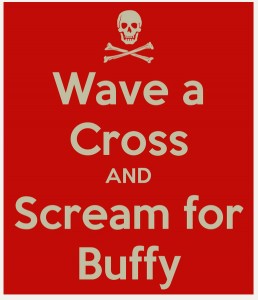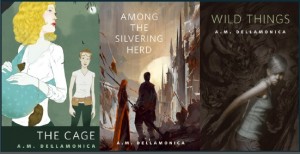One of my Novel 1 students, Valerie Borey, has a flash story up at InStereoPress. It’s called “Here’s the thing, Kid,” and it’s got some lovely prose. But, a warning: if you’ve recently lost a pet, and are still healing, it’s apt to rip that scab off.
Category Archives: UCLA Extension
How Writers Read, and Sometimes Why
I was having an online conversation recently with one of my novel-writing students about reading more thrillers–because she’s writing one–when one of her classmates chimed in with a question.
It boiled down to this: “How do you learn to write from reading? Is there an article explaining how that works?”
A number of answers occurred right away. There are so many ways to learn from reading other authors, living and dead. It’s a huge question. We learn from a form of osmosis, for example: simply by reading books for pleasure, we absorb some sense of how sentences are supposed to sound, proper grammar, new vocabulary, the idea of voice, fundamentals of worldbuilding, word play, plotting, and how to structure a variety of points of view. Everything we want to try, in fiction, is in a book somewhere.
If we want to try out some particular literary technique, chances are it’s because we read it in a book somewhere. I structured the Indigo Springs frame story as I did, in part, because I wanted to understand novels like Katherine Dunn’s exquisite and heartbreaking Geek Love
.
 We can break down a book we love or admire–examine it scene by scene, plot point by plot point, character journey by character journey. We can outline it, draw graphs, shuffle around cards with the story components jotted on them, all to better understand its structure. On the micro level, we can become better prose stylists by examining small pieces of writing within larger works, the passages that make your heart beat faster, the ones that sing within the mind’s ear because they’re just that effective. (Or, sometimes, the opposite. Gillian Flynn’s Dark Places
We can break down a book we love or admire–examine it scene by scene, plot point by plot point, character journey by character journey. We can outline it, draw graphs, shuffle around cards with the story components jotted on them, all to better understand its structure. On the micro level, we can become better prose stylists by examining small pieces of writing within larger works, the passages that make your heart beat faster, the ones that sing within the mind’s ear because they’re just that effective. (Or, sometimes, the opposite. Gillian Flynn’s Dark Places has some deeply annoying comma splices, which break up its rhythm quite badly.)
Many of you already know I do this, using my text fragment collection.
Moving off the beaten track of this topic, there are also a number of books and movies about readers and writers, pieces that are instructive. They’re fiction, is what I’m saying. But they can add to your understanding of craft, or discipline, or process. A somewhat frivolous example would be the romantic comedy Music and Lyrics, which–amid the tasty froth of a boy meets girl tru luff always storyline–sneaks in some hard truths the value of art, the persistence and commitment it requires, genre snobbery, writer’s block, trying too hard, and giving up too soon. All that and Drew Barrymore, too!
Or, if you want something loftier in this vein–not to mention thoroughly wonderful–go pick up Alan Bennet’s novella “The Uncommon Reader” It’s about the birth of a writer, a certain eminent person who takes up reading comparatively late in life and who does nothing, for most of the story, but read, read, and read some more. If you want a fictional and yet true answer to “How do you learn to write from reading?”, this is very much it. And the beginning of that answer? Learn to read. Or, rather to read. Not glancingly or inattentively, but with passion, intent, and thoughtfulness.
(This novella is, btw, quirky and delightful. You’ll laugh.)
I hope to have more on this subject in the future, and perhaps not just from me. In the meantime, what do you all think?
Slayers are so helpful on the #BuffyRewatch
 This week’s rewatch covers the episode “Help,” which is the one where a young teen predicts her death, and Buffy tries to stop it.
This week’s rewatch covers the episode “Help,” which is the one where a young teen predicts her death, and Buffy tries to stop it.
Today is the last really full week of work for my Novel One students at the UCLA Extension Writers’ Program. They’ll walk out with a first chapter, an outline, and a plan for moving forward with their projects. Starting next month, I’ll be teaching “Creating Universes, Building Worlds,” which is the speculative fiction course with a focus on short stories. There are still some slots for students in this one; if you have any questions, let me know.
In terms of one-on-one mentorships, I will not be taking new students for at least the first couple of months of 2014. I could be persuaded to run a waiting list, so if you are interesting in this and we haven’t talked before, reach out.
I hope everyone had a good Thanksgiving, if you happened to celebrate it last week.
Reading, Riting, Rithmatik
 I have begun Hilary Mantel’s Wolf Hall
I have begun Hilary Mantel’s Wolf Hall
this week, having finished The Great Influenza: The Story of the Deadliest Pandemic in History and Hild
, but I have only just scratched the surface. The bulk of my readerbrain is engaged with my Novel 1 students at the UCLA Extension Writers’ Program. They turned in their first chapters this week, and are deep in the workshop process. The group of them have some delightful books on the go; it’s always incredibly cool to see novels just sprouting, in this very new stage. I’m a fan of beginnings: many of my all-time favorite TV episodes are pilots. But I do need to pick myself another history or science book. I find it easier to read non-fiction when I’m reading student submissions. Hmmm, this probably means it’s time to crack The Best American Science and Nature Writing 2013
.
Next quarter I will be teaching Creating Universes, Building Worlds, and in the spring I will be running the more advanced Writing the Fantastic. Both classes will be open to new and returning students–I’ve had people take CUBW more than once, just for the chance to workshop again. Both have filled fast the last few times they’ve been offered.
Speaking of books, my very fun day-counting app now has an entry for the release of Child of a Hidden Sea; it’ll be out in 223 days.
Toronto day 76
Kelly and I went to a book launch for Ryan North’s Choose Your Own Adventure Hamlet graphic novel, To Be or Not To Be on Monday. It was a massive event–the signing was happening outside a pub, and across the street, people were getting their pictures taken in quasi-Elizabethan dress. At some point a three-man theater troupe did a fifteen-minute version of Hamlet which was pretty hilarious.
(It was odd, too, because the other play we’ve been to since arriving here was also a literary adaptation where a couple people played all the roles, this time of Pride and Prejudice.)
The last week or so has held a pleasing mix of delights: I am poking away on two short stories at once. I am not sure where either of them is going, but that’s part of the fun. I am back at the mentoring gig as of yesterday and am so glad to have resumed that part of my life and routine. My current Creating Universes students are chatty and engaged, passionate about SF books, and a thoroughgoing delight. I had lunch with Peter Watts yesterday, have hung out with my sister a couple times, and am looking forward to the next ChiZine reading at Augusta House.
There has been lots of yoga, and there will be more tonight.
The coming weekend is a long weekend, just as it is in B.C., and we’re going to check out the Simcoe Day festivities at Fort York, for no better reason than that it’s a ten minute walk from our place.
Happy August, everyone!


